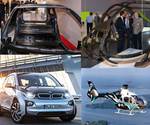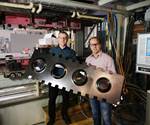Triumph Aerospace Structures to design eVTOL airframe for Jaunt Air Mobility
World’s third largest aerostructures supplier will help develop a lightweight design for Uber’s latest partner per its reduced rotor operating speed aircraft (ROSA) technology.
Triumph Group, Inc. announced at the Uber Elevate Summit in Washington, D.C. that its Triumph Aerospace Structures business unit has entered into a non-binding memorandum of understanding (MOU) with Jaunt Air Mobility to provide engineering services in support of Jaunt's all electric Vertical Takeoff and Landing (eVTOL) concept air vehicle. Triumph will support Jaunt's efforts to develop and build a full-scale demonstration aircraft based on Jaunt's reduced rotor operating speed aircraft (ROSA) in support of urban air mobility (UAM) operations. Uber announced two days ago that it has added Jaunt Air Mobility as its newest partner.
"Working with Jaunt and our other partners, Triumph will help bring ROSA to reality," said Kaydon Stanzione, CEO of Jaunt Air Mobility. "Triumph's experience in innovative structural design is essential for streamlining future certification of Jaunt's unique configuration."
"We are excited to be a key contributor to Jaunt's new air vehicle concept. Triumph's experience in aircraft design, development, and certification, demonstrates the capabilities required to bring the Jaunt eVTOL air vehicle to reality, and achieve their program milestones consistent with the growing market potential for eVTOL aircraft and Uber's vision for all-electric, on-demand aviation," said Michael G. Engers, Vice President, Strategy and Business Development.
Triumph Aerospace Structures will design the aircraft structure to optimize weight, cost, and producibility in support of the program. The engineering services will be provided at Triumph's Technology and Engineering Center in Arlington, Texas. Triumph is the third largest aerostructures supplier behind Spirit AeroSystems and GKN, according to Counterpoint Market Intelligence.
Jaunt Air Mobility claims ROSA combines the best features from helicopters and fixed-wing airplanes. Upon announcing Jaunt Air Mobility as its latest partner, Uber reiterated that it needs a range of vehicle partners to make urban air mobility a reality.
“Jaunt Air Mobility has assembled a highly talented team of experienced engineers with a long history of designing and certifying eVTOL vehicles,” said Uber Elevate director of engineering Mark Moore. “Martin Peryea, Jaunt’s Chief Technology Officer, has led many helicopter development programs as a chief engineer and brings invaluable insights to developing low noise, reliable, and safe aircraft. I look forward to seeing what our teams accomplish together as we aim to accelerate Jaunt’s commercialization efforts.”
To date, Uber is working with more than five vehicle partners, including Boeing, Embraer and Bell. Uber plans to begin testing Uber Air next year and is sticking to its launch goal of 2023 in Dallas-Fort Worth/Frisco, Texas and Los Angeles, California.
Related Content
-
Paris Air Show 2023 highlights
The Paris Air Show, one of the largest aerospace trade shows in the world, returned for the first time since 2019 and proved that the global aviation industry industry is very much alive and kicking.
-
Plant tour: Joby Aviation, Marina, Calif., U.S.
As the advanced air mobility market begins to take shape, market leader Joby Aviation works to industrialize composites manufacturing for its first-generation, composites-intensive, all-electric air taxi.
-
Composites opportunities in eVTOLs
As eVTOL OEMs seek to advance program certification, production scale-up and lightweighting, AAM’s penetration into the composites market is moving on an upward trajectory.


.jpg;maxWidth=150;quality=70)













